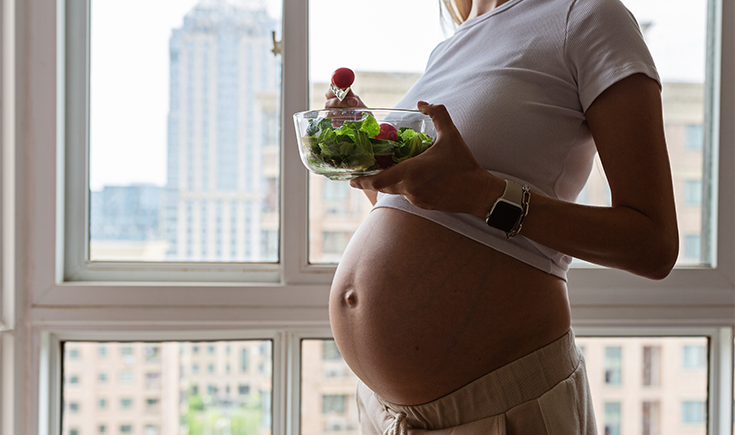

Was overwhelming tiredness one of the first signs you were pregnant? You can thank your hormones for that (they’re usually responsible for most unwanted side-effects as a woman!). The rise in progesterone plus the exhausting work of growing a baby, combined with the changes to blood sugar, blood volume, and blood pressure, are all enough to make you feel wiped out.
You might be tempted to reach for the flat white or the chocolate bar (and of course, you can if you choose to. Read our article Caffeine during pregnancy to find out how much is safe), but just so you’ve got some other longer-lasting and sustaining energy boosters in your arsenal, here are 5 natural energy boosters to help you win the pregnancy fatigue battle.
5 natural energy boosters during pregnancy
1. Water
Fatigue is often the first sign that you’re not drinking enough water. Keeping hydrated during pregnancy is vital. Water is necessary to help carry nutrients to your cells, and it helps to replenish the amniotic fluid supply. Aim for at least 2 litres of fluid per day (on average, as this can vary between women), which can come from other drinks, such as coconut water and tea as well. Sip on water throughout the day, and if you get bored of it, add in some mint, cucumber, lemon, lime, or frozen berries for some extra flavour.
2. Iron-rich foods
Many pregnant women can become low in iron because they’re producing a lot more extra blood, particularly during the later stages as the body prepares for birth. Get your iron levels checked, and give your diet a good iron boost to help with the fatigue. Iron-rich foods include spinach, lean beef, salmon, lentils, broccoli, and sweet potato.
3. Protein
Protein foods are great for providing long-lasting energy and stopping the crazy blood sugar spikes. Nuts are an ideal protein snack that you can carry in your bag for an energy boost when you need it, and they contain healthy fats and magnesium to sustain you longer. Try to eat small pieces of meat, poultry, seafood, or legumes each day.
4. B-vitamin foods
B vitamins are wonderful for energy and perfect for pregnant women with anaemia given their role in blood regeneration. Enjoy some oats for breakfast, and then add in dairy foods, eggs, meat, organ meats, sunflower seeds, and dark green vegetables for your other meals. Your body can’t store B vitamins for very long (aside from B12), so you’ll have to keep getting them through your food.
5. Fibre
As well as helping you to feel full, fibre can assist in regulating and controlling blood sugar. It also has the added benefit of keeping you regular, preventing constipation, lowering blood pressure, and reducing pregnancy risks such as preeclampsia. Vary your diet with vitamin and mineral-rich foods such as strawberries, apples, bananas, beans, nuts, whole grain cereals, brown rice, carrots, and tomatoes.
How often you eat is important too
Eating smaller, frequent meals during pregnancy is beneficial, particularly if you can’t stomach big meals. Even once (or if) the nausea and vomiting has passed, your expanding uterus later during pregnancy makes it harder to eat big meals. Eating little and often helps to reduce heartburn and other digestive issues.
If you’re doing all of these things and eating a balanced diet, it’s a good idea to talk to your doctor, midwife, nutritionist, or naturopath to rule out any underlying issues.























